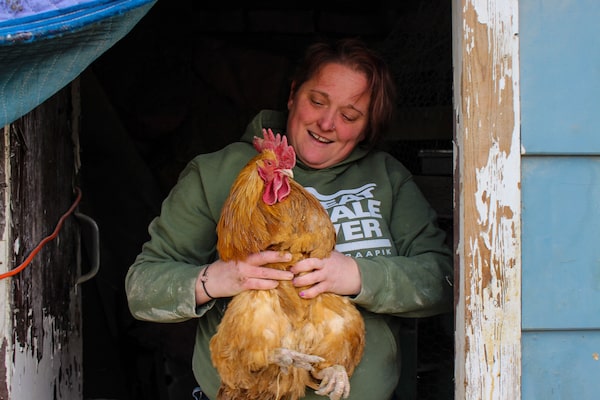
Raygan Solotki and Daisy.Nancy Macdonald/The Globe and Mail
The rust-coloured hens running around like maniacs in Raygan Solotki’s downtown Inuvik yard are getting their first taste of the outdoors this year. It’s May, and they’ve spent the past seven months inside Ms. Solotki’s heated tool shed.
The beady-eyed survivors of an especially brutal Arctic winter are proof that even here, 200 kilometres north of the Arctic Circle, backyard chickens can thrive.
“Empowering people to grow their own food is super important,” says Ms. Solotki, the executive director of Green Iglu, a charity focused on food security. “But you’re never going to create vegetarians in the Arctic. And you’re not going to solve food insecurity with lettuce.”
Ms. Solotki, a former Inuvik town councillor and volunteer firefighter, got the idea for the birds after visiting Rovaniemi, a community in Lapland, Finland’s northernmost region. “They have a climate similar to ours and are producing enough cheese from their cow farm to feed their entire population.”
So she set out to prove that small-scale farming was possible in Canada’s Far North, too.
Once the hens were inbound, however, Ms. Solotki began to panic: “Will they go stir crazy? What do they need? How much light do they need? Do they need to go for a walk? Like, do I need little chicken harnesses?”
She never did buy them leashes. “But I’m not gonna lie. My chickens have a great life.”

Fresh eggs were never an Arctic reality until now.Nancy Macdonald/The Globe and Mail
They have a “cushy little barn and tons of visitors.” Local young people – many of whom had never seen a real chicken before – are particularly fond of the birds.
Ms. Solotki didn’t realize quite how attached the community had become until the day she discovered that Daisy, one of her favourite hens, was really a rooster.
Early one morning, she woke to Daisy testing out his vocal cords. After placating him with a package of blueberries, she hopped on the Inuvik Facebook Marketplace page – which people here often use to address the wider community – to apologize for the early morning noise. Daisy would be “in a soup pot by dinner time,” Ms. Solotki promised.
Within a few hours, dozens of people were imploring her to spare the rooster. Their kids loved his crowing, some wrote. One launched a SaveDaisy hashtag.
So Ms. Solotki learned to keep Daisy indoors until 9 a.m. She also tried to change the rooster’s name to Duke, but it never took: “He is a Daisy, through and through.”
The challenge in keeping the birds alive in the North is no different than the challenge in keeping people alive, Ms. Solotki said. A bag of chips costs $7 here. Hay runs $45 a bale. A two-bedroom townhouse rents for $2,100 a month.

Exiting the coop.


Their first taste of spring.Nancy Macdonald/The Globe and Mail
The community has been a huge support. NorthMart, the local grocery store, provides Ms. Solotki’s chickens with spoiled food. When she runs low on scraps, she puts a call out on Marketplace: “Within five minutes, I will get about 100 pounds of food. Not just vegetables, but caribou roasts that have gone off, freezer-burned meats.”
Chickens will eat anything – off cheese, old hot dogs, yogurt. “They will even eat chicken. I won’t feed it to them, though. I don’t want them to eat themselves.”
Fresh eggs were never an Arctic reality until now. Northern stores do the best they can, Ms. Solotki says, but their eggs are at least eight weeks old by the time they get to Inuvik. The Dempster Highway connecting Inuvik with Dawson City closes for two months every fall, until the ice is in, and again for two months in the spring, until the ferries can safely operate. Closures for bad weather are a constant all winter long.
Ms. Solotki makes $18 a day selling the three dozen eggs her chickens produce every morning. “They’re busy, busy girls.” They’re the first animals she’s ever had that have actually paid for themselves “My dogs, my cats – total freeloaders.”
Her urban farm was going so well that she was planning to add pigs this summer. (“The great thing about Inuvik,” she says, “is there are no bylaws.”) But she broke her back last winter fighting a house fire, so she is moving to Alberta for treatment as soon as the southbound Dempster Highway reopens.
The Arctic chickens, however, are staying. Two families in Tsiigehtchic, a remote Mackenzie Delta hamlet of 200, have agreed to take them in.
The knock on chickens has always been that they’re dumb as stumps. Nothing could be further from the truth, Ms. Solotki says, the gals clucking and purring at her feet. She knows them by their quirks. She worries about them. Her favourite is blind as a bat.
“She comes running over to sit on my boot whenever she hears me. They’re kind of like little dogs. I’m very attached to them,” she adds. “But I also would eat them. That’s just the reality.”
Our Morning Update and Evening Update newsletters are written by Globe editors, giving you a concise summary of the day’s most important headlines. Sign up today.